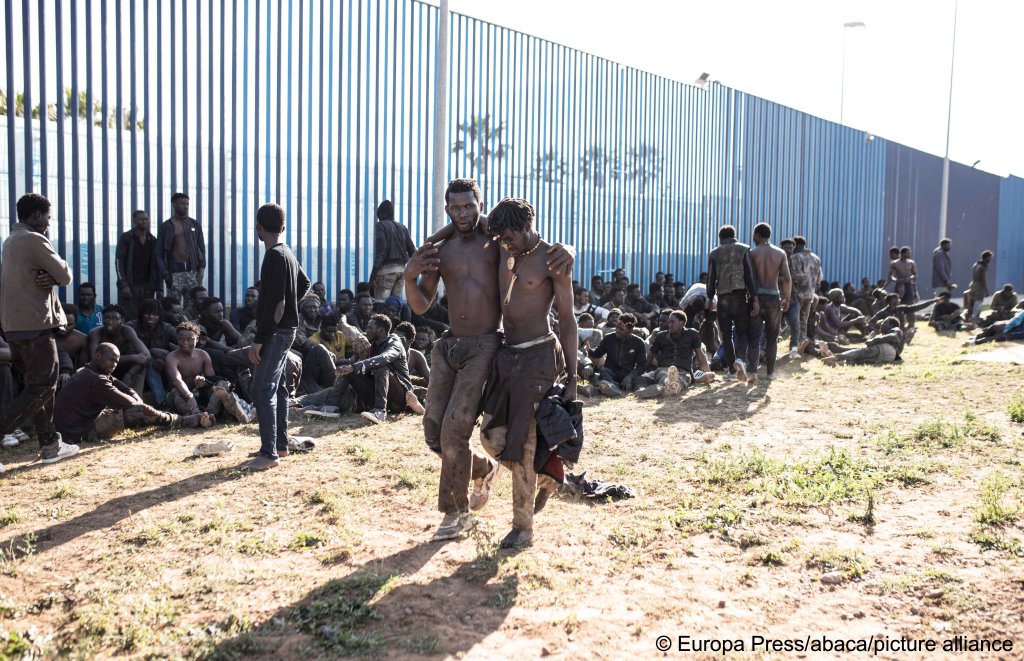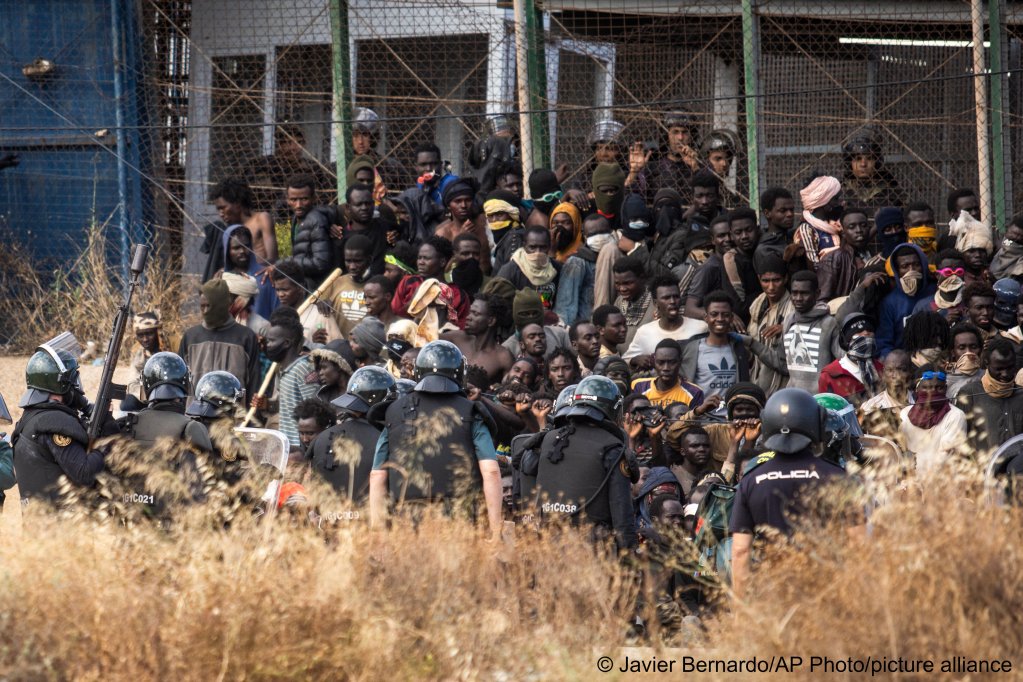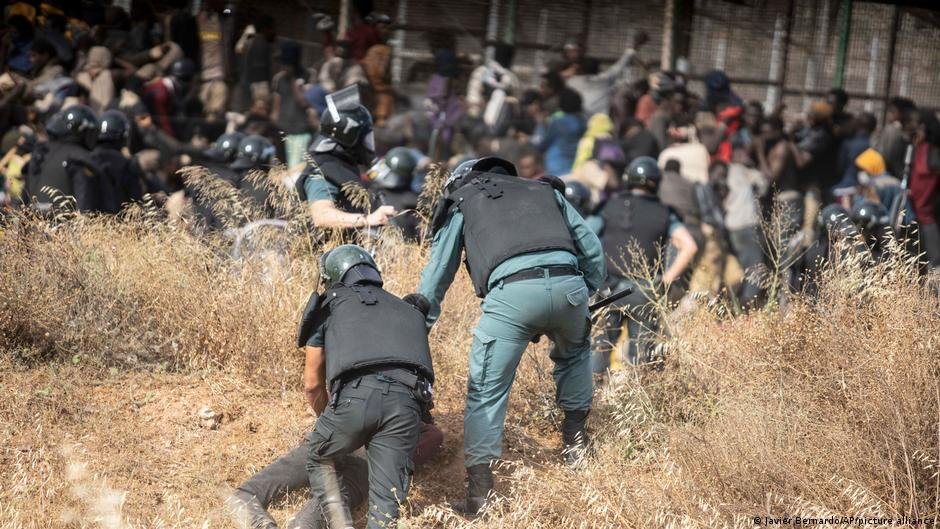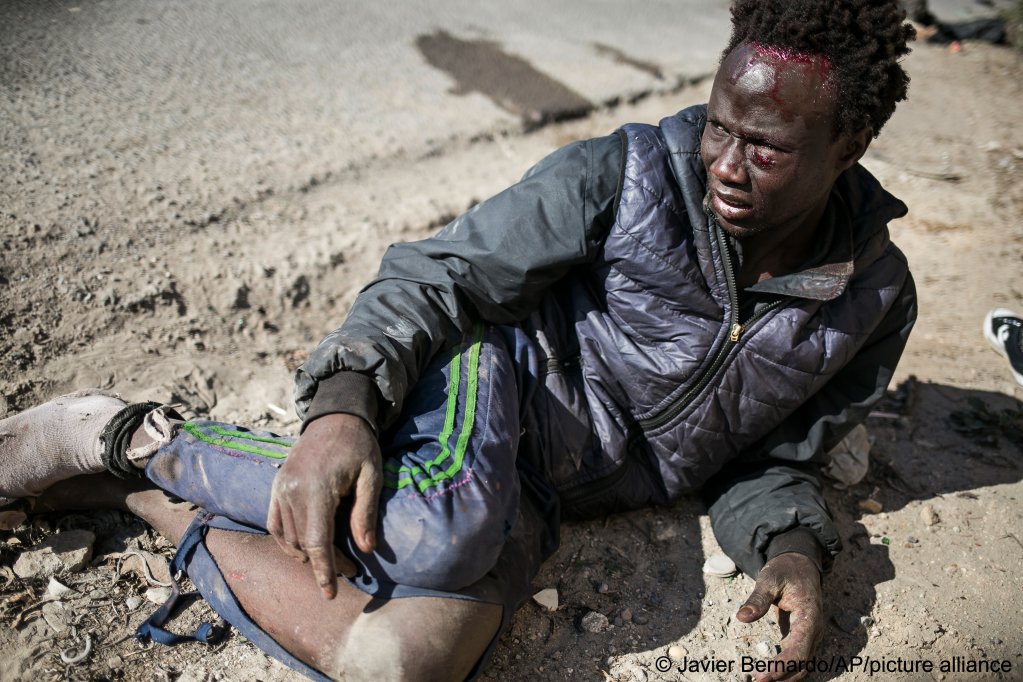Alhafiz Trjok was among a group of about 2,000 migrants who attempted to cross into the Spanish enclave of Melilla on June 24, 2022. The attempt was met with violent response by Moroccan and Spanish forces, and at least 23 migrants died in one of the deadliest incidents at Europe’s borders in recent years. Trjok has now published a book to echo the voices of migrants involved in the tragedy.
This text was originally written in Arabic and published on InfoMigrants Arabic.
It has been three years since he survived the deadly Melilla incident, but the 2022 tragedy still haunts Sudanese refugee Alhafiz Trjok.
Back on June 24, 2022, about 2,000 migrants attempted to cross into the Spanish enclave by storming a border post, triggering violent skirmishes with Moroccan security forces and Spanish border guards.
Most of the refugees were from Sudan, and the attempt led to the death of at least 23 migrants.
In his book, published last December, Trjok unveils rare, firsthand narratives and eyewitness accounts of the Melilla turmoil.
In his account, the crossing attempt was not a spur-of-the-moment decision, but was driven by a pre-planned effort by the migrants to scale the fence.
Trjok tried in his book to echo the voices of his fellow migrants to document the tragedy. "I am seeking justice for the dead ones," he told InfoMigrants.
Read AlsoMigrant deaths at Melilla border post: Three years on, truth remains elusive
From El Fasher to Melilla
Trjok was born in 1998 in Al-Fashir in Sudan's North Darfur.
After graduating from high school in 2019, he traveled to Egypt in search of a better future. In Cairo, he learned English and enrolled in a medical school after landing a scholarship funded by the UN refugee agency UNHCR.
In 2020, he returned home even though Trjok had not wrapped up his scholarship.
But he decided to escape Sudan in hopes of a better life as political and economic woes engulfed his country.
In October 2021, he decided to embark on a perilous journey to migrate to the United Kingdom irregularly.
To reach the UK, Trjok had to cross through deserts and mountains in the Sahel and West Africa, as he decided to avoid Libya, where refugees and migrants in the North African nation are trapped in a vicious cycle of violence and abuse.
Like many migrants hailing from East and Central African nations, Trjok chose to pass through Morocco.
He crossed the Sudanese border into Chad, then Niger and Mali, passing through Mauritania, until he made it to Dakhla, a city in disputed Western Sahara.
Dakhla lies on the Atlantic Ocean about 1,600 kilometers south of the Moroccan capital.
"It seemed like a normal journey, but it was full of horrors as we tried to escape from border guards and their dogs," Alhafiz Trjok told InfoMigrants.
From Morocco, Trjok embarked on a relentless journey northward, passing through Marrakesh, Rabat, and Fqih Ben Salah. He hoped his risky journey would lead to Europe.
At the razor-wired borders of Melilla and Ceuta, he made multiple daring attempts, but each time he and others were intercepted by border guards who sent them back to central Morocco.
Despite this, his resolve to reach the English coast never wavered.
"We slept on the streets, soaked by rain and chilled by the cold. But Moroccans shared what they had -- whatever food or clothes. We had to work daily to survive and send some money to our families in Sudan," Trjok recalls.
Read AlsoMorocco intercepts over 1,100 migrants near Spain's Ceuta and Melilla exclaves

A three-month plan to cross
Alhafiz Trjok was not alone in his dream, as many migrants shared hopes of crossing the fence.
The individual attempts to cross the fence were intercepted by vigilant Moroccan and Spanish border guards.
"So, we decided to organize a mass attempt to cross," Trjok said.
"It was something like a movie. The planning process took three months, from March 3, 2022, until June 24, 2022.
"The adventurous, meticulously coordinated operation was spearheaded by Sudanese and Chadian migrants in Casablanca, part of a sprawling mafia-like network which consisted of eight groups scattered across several Moroccan cities," he said.
The then-migrant and now-author added, "Each group includes a leader, a deputy, a financial officer, and something like a logistics coordinator. They were tasked with organizing the migrants’ perilous journey, securing supplies, and helping migrants to assemble secret points."
"We were approximately 1,700 migrants. Most of them were seasonal laborers, known locally as 'Jangaw', in addition to migrants from Chad, Mali, Niger, Kenya, and Burkina Faso," said Trjok.
He added, "We were staging on Mount Gourougou, looming over Nador. We were waiting for the moment to cross the fence."
However, they were intercepted by Moroccan and Spanish guards who used tear gas, rubber bullets, and deadly baton blows to prevent them from crossing the fence.

At least 37 dead, fate of dozens of others remains unknown
According to Amnesty International, the tactics used by Moroccan authorities contributed to the deaths of at least 37 people, with dozens more injured. The fate of at least 77 others remains shrouded in uncertainty.
He said, "What began as a desperate bid for freedom ended in chaos and bloodshed."
Worse still, a Moroccan court sentenced 33 migrants in July to 11 months in prison on charges ranging from "illegal entry" to "setting fires in forests" and "attacking public forces."
"I came within inches of death. I almost lost an eye after being severely beaten by Moroccan forces," Trjok said.
"At the end, I was detained and then was transferred to the city of Fqih Ben Saleh, where I spent seven months working temporary jobs," he added.
After the war erupted in 2023 in Sudan between the army and the Rapid Support Forces, his life was getting worse and worse.
He said, “I can no longer go back home.” He had to seek to cross into Europe, but this time via Tunisia.
He crossed into Tunisia on foot via Algeria, eventually settling in the coastal city of Sfax. For a month, he lived in limbo, making two failed attempts to cross the Mediterranean before making it on the third.
On September 1, 2023, he boarded an 18-meter boat with 36 other Sudanese migrants to cross the Mediterranean en route to Lampedusa.
"We were organized, distributing water and food, and taking turns sleeping inside the boat. On the second day, the waves almost swallowed us up. We spent three days at sea," Trjok said.
"We reached Italy. Twelve days later, I moved on to Calais, France, where I spent five months before finally arriving in Yorkshire, England, in March 2024," he added.
Read AlsoMorocco: Nearly 80,000 attempts to reach the EU prevented in 2024

A Novel for the Dead
A few months after arriving in Britain, Trjok sought to document his journey’s horrors in a novel titled Friday of Death, in a pointed reference to the day the tragedy unfolded.
He wrote his novel, which mimics genuine documentation and personal narrative, in a mix of classical Arabic and Sudanese dialect.
"After I survived the incident, I found myself free and breathing the freedom in the Moroccan cities. I sat alone, remembering that incident, and thought about what had happened and what could have happened to me, and what did happen to so many of my comrades who died. I said to myself that one day I would write a novel about this tragedy as a memorial to the comrades who lived through it."
Read AlsoSpanish list reveals extensive use of tear gas against migrants in Melilla tragedy

Never Forget
He said, "I tried hard to write about what I saw during this tragedy and the horror of that bleak day and the lives and suffering of migrants in Morocco."
His novel got support from Sudanese writer Abdelaziz Baraka Sakin, who helped him shape the title Friday of Death.
Another well-rounded human rights defender and expert helped Trjok. Omar Naji, vice-president of the Moroccan Association for Human Rights, gave the Sudanese author vital data on the victims and missing.
Naji works on refugee and immigration issues.
"The victims were forgotten as if they weren't human, and the perpetrators were not held accountable," says Trjok. "I want justice for the dead, compensation for their families, and the release of the detainees from Moroccan prisons."
After more than a year in Britain, Trjok has been granted asylum and is preparing to enroll in a university.
"I've changed my mind. I no longer want to study medicine, but I want to master English. I will try to tell stories which must not be forgotten."
Author: Mohammed Magdy
Translation: Mohamed Farhan
